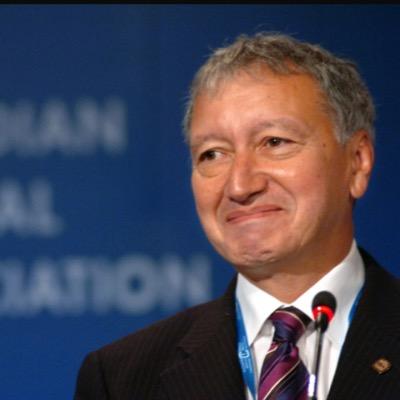
Dr. Brian Day
@DrBrianDay 
- Past President Canadian Medical Association
- Past President Arthroscopy Association of North America
- Honourary Associate Professor University of British Columbia
- 2014 Doctors of BC Don Rix Leadership Award


CORNER BROOK
GARY KEAN
The president of the Canadian Medical Association (CMA) says Newfoundland and Labrador is an ideal place to lead the charge when it comes to reforming the health care system across the country.
Instead of a system that serves patients, said Dr. Brian Day, Canada forces patients - and health care workers - to serve the system
"That must change," he emphasized.
During the Newfoundland and Labrador Medical Association's annual general meeting at Humber Valley Resort Saturday, Day told delegates about a recent CMA conference which heard an emergency doctor describe how four patients died in his emergency room without being seen by staff and how a general surgeon in British Columbia had to cancel six breast cancer surgeries in one month.
"Sadly, such events are not rare in Canada," he said. "Let us be very clear on the reality that our failure to provide timely access comes with a major cost, both medically and financially."
A recent study released by the CMA showed that, in addition to the human suffering, patients waiting for care in just four targeted areas - namely joint replacement, cataract surgery, heart bypass grafts and MRI scans - cost the Canadian economy $14.8 billion in 2007.
"The estimates in this study excluded the growing, and significant, costs of waiting to see the GP or specialist, and excluded the cost of deterioration as patients wait and sometimes develop chronic and severe irreversible damage, addiction to painkillers and depression," added Day.
In February, another report estimated the economic cost of mental health in Canada to be a staggering $51 billion.
"We are paying to prevent patients getting better," charged Day.
"The prevention of patients getting better is not what doctors mean when we talk about preventative medicine."
In a study comparing Canada's health system to 29 European countries, Canada ranked 23rd - alongside countries such as Slovenia, Romania and Lithuania - in terms of value for money spent on health care.
Day says there is no reason why Canada cannot eliminate its wait lists, as have several European countries - including England, France, and Belgium - with universal health care and which spend about the same money - or less - on health care as Canada does.
To do so, Day said Canada must eliminate the block funding approach to health care in favour of building incentives to treat patients and stimulate healthy competition. That would include hiring more doctors and setting performance targets which hospital administrators have to achieve in order to keep their jobs.
"Patient-focused funding increases productivity and reduces wait lists, even in primarily government-operated systems and especially in rural hospitals ... In just four years, hospital waiting lists in England have plummeted and virtually all patients now receive treatment in less than three months," said Day.
He said Newfoundland and Labrador is a good candidate for instituting such changes because it has a relatively low population.
"Change in Canada is going to happen and has to happen because of the demographics with the baby boomers, the aging doctors and the shortage of doctors," said Day. "A smaller province like Newfoundland is probably more flexible and adaptable than a bigger province. It will take one (province) and the others will follow ... It wouldn't be difficult and is something that can happen quickly because we can borrow from the methodology of a country like England and learn from their expertise and what they have done."
Day philosophically supports a role for the private sector, but says it is incapable in and of itself of providing a practical solution for the health care system's many problems. He said the other key ingredients are expanding the capacity of Canadian medical schools and enhancing the role of information technology in the patient-doctor relationship.